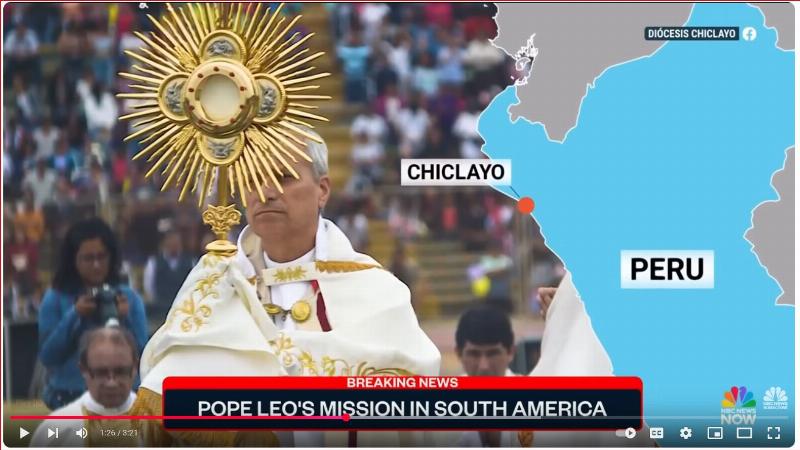


For all the interest in the U.S. about new Pope Leo XIV's time in Chicago, and Louisiana Creole heritage, and how it might translate into his papacy, it's worth it to look at his time in Chiclayo, Peru, where the bulk of his working life was spent as a bishop and seminary director for clues about the direction of his papacy. After all, it amounted to some 20 years, and included his taking out Peruvian citizenship.
Everyone loves this picture of him looking very Peruvian, riding a horse:
???? Pope Leo XIV as Bishop of Chiclayo in Peru, July 2020 • ‘he would set out on horseback to reach the most remote places’ .. ‘a simple person with a message of hope’????????????️???????? https://t.co/3GA0u9fz2T pic.twitter.com/HLqCXfK1ux
— neuro.social.self (@neurosocialself) May 10, 2025
Horse culture has got to be big in Peru. Recently, writer Alvaro Vargas Llosa told me on X that Peru's signature weather pattern of heavy cloud overlay (what we in San Diego call 'May Gray' and 'June Gloom') is known as 'panza de burro' in Peru, meaning, "belly of the donkey," the sky like thick and whitish gray belly fur.
Everything about the horse, there. So no surprise the future pope was photographed on a horse.
This account here from OSV News gives deeper insight on what the future Pope Leo XIV was like as a churchman in northern Peru, starting with the local reaction:
On May 8, when white smoke rose over St. Peter’s Square, signaling the election of Leo XIV, Peru seemed to hold its breath. Schools went silent. Restaurants turned up their televisions. Taxi drivers, hairdressers and shopkeepers paused mid-conversation.
And then, as the name of Chicago-born Robert Francis Prevost, a former bishop of a dusty northern diocese of a country called “Poland of South America” because of its Catholicism and a naturalized Peruvian citizen, rang out, the country erupted.
“We screamed,” said Aldo Llanos, a professor of philosophy and anthropology in the University of Piura. “It was like a World Cup goal.”
The story, which is very well written, describes how the pope was a good Ron DeSantis-style crisis manager, doing the things needed to help the place recover from a punishing flood:
“Bishop Prevost was never the kind of bishop who gave orders from behind a desk,” said Janinna Sesa Córdova, who led Caritas Chiclayo from 2014 to 2024. “He was the face of Christ, the one who went out into the mud to help his people.”
When the La Leche River overflowed, cutting off roads and displacing entire neighborhoods, the future pope mobilized the church. “He always made sure the church stood on its feet,” Sesa said. “He coordinated with local businesses for donations, and with the help of civilian volunteers and the armed forces, we were able to airlift aid into isolated areas.”
He did the same with COVID, raising money to help the locals. I'd be interested in his views on ivermectin, which was used extensively in Peru, reducing the casualty count, once again, because the horses.
He also tended to stay quiet and self-effacing, although he spoke his mind in private, which is the cultural style of northern Peru (southern Peru is another story)
Unlike more confrontational church figures, Leo XIV built a reputation as a calm, balanced and deeply pastoral leader. “He is not one for public clashes or flashy gestures,” said Llanos. “If he had a hard truth to share, or a correction to make, he did it in private.”
According to the anthropologist — in a region infested by corruption, illegal mining and organized crime — “we know” of several harsh letters in which he chastised the locals.
His ability to navigate conflicting political and ecclesial positions with diplomacy led to him being appointed second vice president of Peru’s bishops’ conference in 2018 and later his appointment to Rome as prefect of the Dicastery for Bishops.
The Peruvians liked his hands-on style:
“He has left an indelible mark on the hearts of Chiclayo,” Sesa, who worked in Caritas, added. “Because he was always there — in the floods, the pandemic, the celebrations, and the sorrows. A bishop of the people. A true shepherd.”
That portends well for those of us in the U.S. who are conservatives. He probably won't be as difficult to take as Pope Francis who didn't 'get us' at all. An even more detailed layout of his history can be found in this post here, and again, it portends pretty well for us.
